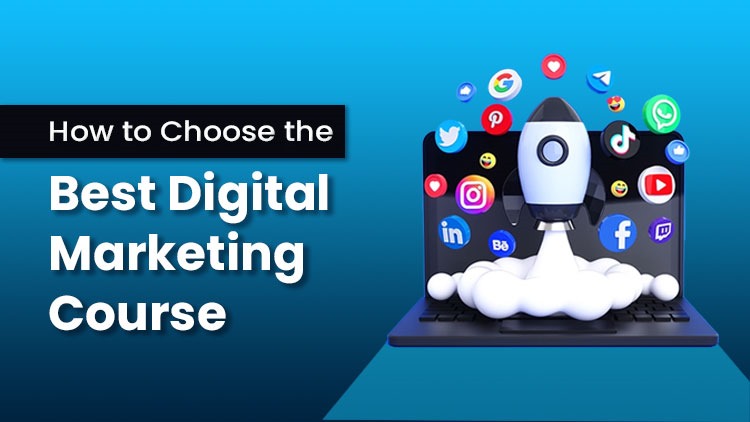
How to Choose the Best Digital Marketing Course

Introduction
Digital marketing has evolved at a rapid pace over the past decade, and it continues to be a cornerstone of business success in 2025. With increasing reliance on digital platforms, companies are investing more heavily in their online presence, creating a high demand for skilled digital marketers. Choosing the right course is crucial if you are looking to enhance your career or pivot to digital marketing. This blog will help you navigate the digital marketing training landscape and ensure that you make a choice that aligns with your career aspirations.
Ready to take your digital marketing to the next level? Dive into VERSAtile Reads for resources such as exam cram notes, companion guide, and exam cram notes that will help you build a stronger online presence and achieve real results. Start mastering the art of digital marketing today!
Why Should You Take a Digital Marketing Course?
- High Demand for Digital Skills: Businesses are increasingly relying on digital marketing to reach their audiences. A course can help you acquire in-demand skills that make you job-ready.
- Career Growth Opportunities: Digital marketing roles, such as SEO specialists, social media managers, and PPC analysts, are highly valued and often come with competitive salaries.
- Stay Competitive: Whether you’re a business owner, marketer, or aspiring professional, staying updated with the latest tools and strategies ensures you remain relevant.
- Scalable Skills: The skills learned in digital marketing courses are applicable across industries, making it a versatile career option.
- Cost-Effective for Entrepreneurs: Learning digital marketing can help small business owners save costs by running their own marketing campaigns effectively.
Types of Digital Marketing Courses
- Search Engine Optimization (SEO): Focuses on optimizing websites to rank higher on search engines like Google.
- Social Media Marketing (SMM): Covers platforms like Instagram, Facebook, LinkedIn, and TikTok to grow brand presence.
- Content Marketing: Teaches strategies for creating and distributing valuable content to engage audiences.
- Pay-Per-Click (PPC) Advertising: Focuses on paid advertising methods like Google Ads and Facebook Ads.
- Email Marketing: Covers strategies to build and manage email campaigns for engagement and conversion.
- Affiliate Marketing: Learn how to earn commissions by promoting other businesses’ products/services.
- Digital Analytics: In-depth training on tools like Google Analytics to measure performance and improve strategies.
- Integrated Digital Marketing: Comprehensive courses covering multiple channels and their integration.
Free-to-Start Digital Marketing Courses
-
Google Digital Garage
-
- Offers free courses on topics like SEO, SEM, and analytics.
-
- Certification: Yes
-
HubSpot Academy
-
- Free courses on content marketing, email marketing, and inbound strategies.
-
- Certification: Yes.
-
Meta Blueprint
-
- Focuses on Facebook and Instagram marketing.
-
- Certification: Yes (free and paid options).
Pros and Cons of Digital Marketing Courses
Pros |
Cons |
| Skill Enhancement: Gain hands-on experience in tools like Google Ads, Analytics, and Canva. | Information Overload: Broad topics can overwhelm beginners. |
| Career Opportunities: Opens doors to roles like social media manager, SEO analyst, or digital strategist. | Constant Updates: Trends and tools change frequently, requiring ongoing learning. |
| Flexibility: Online courses are self-paced, allowing learning anytime, anywhere. | Practical Experience Needed: Theoretical knowledge is insufficient without application. |
| Affordable or Free: Many platforms offer free courses, making them accessible to all. | Cost of Advanced Courses: High-quality certifications can be expensive. |
| Certifications: Boosts resume and job market credibility. | Quality Variance: Not all courses are reputable; thorough research is essential. |
Parametrics to Choose the Best Digital Marketing Course
Define Your Goals
-
- Comprehensive Understanding: For a general overview.
-
- Specialization: Focus on SEO, PPC, content, or social media.
-
- Career Transition: Beginner-friendly, foundational courses.
-
- Skill Upgrade: Advanced courses for marketers to learn new tools and trends.
Check the Curriculum
-
- Ensure the course covers:
-
- SEO, PPC, content marketing, social media, and email marketing.
-
- Analytics (e.g., Google Analytics) for data-driven decisions.
-
- Emerging areas like influencer marketing and AI-powered tools.
Course Format
-
- Self-Paced: Learn at your convenience.
-
- Live Classes: Real-time interaction and feedback.
-
- Blended Learning: Combines online lessons with in-person workshops.
Certification and Career Support
-
- Look for industry-recognized certifications (Google, HubSpot).
-
- Courses with career support (job placement, resume reviews) add value.
Reviews and Testimonials
-
- Assess content quality, instructor expertise, and practical application through reviews.
Cost vs. Value
-
- Balance affordability with the quality of content, instructor experience, and included tools.
Practical Experience
-
- Prioritize courses offering real-life projects, tool access, and internships.
Stay Updated
-
- Focus on future trends like AI, voice search, video marketing, and blockchain integration to remain competitive.
Key Points to Remember
Digital marketing in 2025 is more dynamic and impactful than ever before, with numerous opportunities for those looking to enhance their careers or make a career shift. Whether you’re aiming for a broad understanding of digital marketing or looking to specialize in areas such as SEO, PPC, or content marketing, the right course will depend on your personal goals. A strong curriculum that covers everything from SEO to social media marketing and email campaigns is essential, but the format in which the course is delivered is just as important. Whether you prefer self-paced learning, live classes, or blended formats, it’s vital to choose one that fits your lifestyle and learning preferences. Industry-recognized certifications and career support can give you an edge in the competitive job market, while a course that offers hands-on experience will help you apply the knowledge to real-world situations. As digital marketing continues to evolve with emerging trends like AI-powered marketing and video campaigns, staying up-to-date will ensure that your skills remain relevant and valuable.
The Last Look
In a rapidly evolving digital landscape, choosing the right digital marketing course is the key to unlocking your potential. By understanding your career goals and selecting a course that provides practical experience, expert instruction, and a focus on the latest trends, you’ll be ready to take your skills to the next level. Whether you’re stepping into the field for the first time or looking to refine your expertise, the right digital marketing training will empower you to thrive in 2025 and beyond. With platforms like VERSAtile Reads offering valuable resources and insights in terms of guide, practice questions, and exam cram notes, you’re just a step away from mastering the tools that will define the future of marketing.
FAQs
-
What should you look for in a digital marketing course if you are a beginner?
If you’re new to digital marketing, look for courses that comprehensively introduce key concepts such as SEO, social media marketing, email marketing, content marketing, and analytics. Ensure the course offers practical exercises, beginner-friendly materials, and step-by-step guidance to help you build foundational skills.
-
Are certifications from digital marketing courses worth it?
Yes, certifications can add significant value to your resume, especially when they are from recognized platforms like Google, HubSpot, or Meta (Facebook). These credentials demonstrate your expertise and can help you stand out to potential employers or clients.
-
How long does completing a digital marketing course typically take?
The duration varies depending on the course. Beginner courses can take a few weeks to complete, while more comprehensive or specialized programs may last several months. Self-paced courses offer flexibility, allowing you to learn at your speed. Always check the course structure to find one that aligns with your schedule.
- Published Date:



